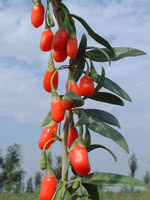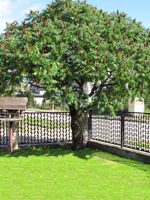Mon-Fri 9am - 5pm Mountain time
Goji Berry vs Staghorn Sumac
Lycium barbarum
Rhus typhina
NOT AVAILABLE THIS SEASON - MIGHT RETURN
NOT AVAILABLE THIS SEASON - MIGHT RETURN
Goji Berry is a woody, deciduous perennial known for its hearty, bright orange-red berries. It typically produces light lavender flowers from June through September, with fruit maturation taking place between August and October.
Goji Berry berries are delicious, nutrient rich, high in antioxidants, and are often called a super fruit. Many describe their flavour as being like a tart cherry tomato.
Staghorn Sumac is a popular ornamental shrub with red velvet like antlers that produce seeds that provide nice winter interest for landscapers and gardeners.
This low-maintenance plant is a great addition to any garden it is also used in shelterbelts.

